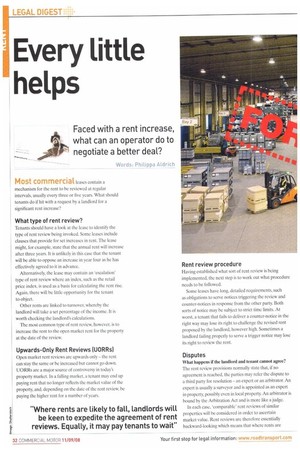Every little helps
Page 32

Page 33

If you've noticed an error in this article please click here to report it so we can fix it.
Faced with a rent increase, what can an operator do to fr---1 negotiate a better deal?
Words : Philippa Aldrich Most commercial leases contain a mechanism for the rent to be reviewed at regular intervals, usually every three or five years. What should tenants do if hit with a request by a landlord for a significant rent increase?
What type of rent review?
Tenants should have a look at the lease to identify the type of rent review being invoked. Some leases include clauses that provide for set increases in rent. The lease might, for example, state that the annual rent will increase after three years. It is unlikely in this case that the tenant will be able to oppose an increase in year four as he has effectively agreed to it in advance.
Alternatively, the lease may contain an 'escalation' type of rent review where an index, such as the retail price index, is used as a basis for calculating the rent rise. Again, there will be little opportunity for the tenant to object.
Other rents are linked to turnover, whereby the landlord will take a set percentage of the income. It is worth checking the landlord's calculations.
The most common type of rent review, however, is to increase the rent to the open market rent for the property at the date of the review.
Upwards-Only Rent Reviews (UORRs) Open market rent reviews are upwards only — the rent can stay the same or be increased but cannot go down. UORRs are a major source of controversy in today's property market. In a falling market, a tenant may end up paying rent that no longer reflects the market value of the property, and, depending on the date of the rent review, be paying the higher rent for a number of years. Rent review procedure Having established what sort of rent review is being implemented, the next step is to work out what procedure needs to be followed.
Some leases have long, detailed requirements, such as obligations to serve notices triggering the review and counter-notices in response from the other party. Both sorts of notice may be subject to strict time limits. At worst, a tenant that fails to deliver a counter-notice in the right way may lose its right to challenge the revised rent proposed by the landlord, however high. Sometimes a landlord failing properly to serve a trigger notice may lose its right to review the rent.
Disputes What happens if the landlord and tenant cannot agree? The rent review provisions normally state that, if no agreement is reached, the parties may refer the dispute to a third party for resolution — an expert or an arbitrator. An expert is usually a surveyor and is appointed as an expert in property, possibly even in local property. An arbitrator is bound by the Arbitration Act and is more like a judge.
In each case. 'comparable' rent reviews of similar properties will he considered in order to ascertain market value. Rent reviews arc therefore essentially backward-looking which means that where rents are likely to fall in the future, landlords will be keen to expedite the agreement of rent reviews so that they can use as comparables rents agreed before the rental market began to dip. Equally, it may pay tenants to wait.
Once the new rent has been agreed, it will generally be backdated to the date of the review and the tenant will need to pay the landlord the arrears together with interest.
Opportunities
Rent reviews can be used as opportunities to renegotiate with the landlord, particularly where the tenant has the right to break the lease, in a falling property market where the landlord is keen to keep the tenant, the threat of breaking the lease might persuade the landlord to agree a lower rent.
If there is no break clause hut the proposed rent will make continuing with the business difficult, a landlord may be prepared to negotiate to avoid being left with an empty building.
However, landlords are always concerned with headline rates they can use these as comparables to agree rent reviews on other of their properties and they are also key measures for valuing the property for investment purposes. Sometimes landlords, while insisting on a full market rent, may give the tenant other concessions such as a rent holiday. is












































































































































































